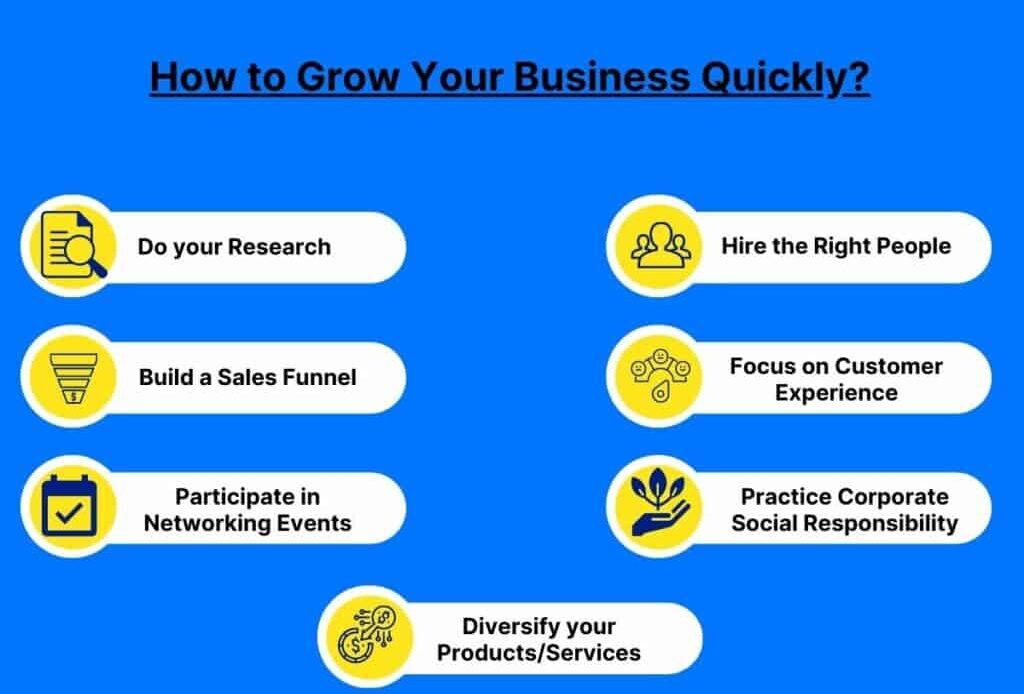To achieve growth and success, small businesses must implement effective strategies. This article is all about Effective Strategies for Small Business Growth. We cover Market Research, Comprehensive Business Plan, Digital Marketing, Building Strong Customer Relationships, Product or Service Differentiation, Expanding to New Markets, Investing in Employee Development, Continuously Innovating and Adapting, Monitoring and Analyzing Performance, Scaling and Diversifying, Effective Financial Management, Utilizing Customer Feedback, and Cultivating a Positive Company Culture, So read this article till the end.
Contents
- 1 Market Research: Understanding Your Target Market
- 2 Comprehensive Business Plan: Building a Roadmap for Success
- 3 Digital Marketing: Expanding Your Online Presence
- 4 Building Strong Customer Relationships
- 5 Product or Service Differentiation: Standing Out in a Competitive Market
- 6 Expanding to New Markets: Identifying Untapped Opportunities
- 7 Investing in Employee Development
- 8 Continuously Innovating and Adapting
- 9 Monitoring and Analyzing Performance
- 10 Scaling and Diversifying: Sustaining Growth Through Expansion
- 11 Effective Financial Management
- 12 Utilizing Customer Feedback: Improving Products and Customer Experience
- 13 Cultivating a Positive Company Culture
Market Research: Understanding Your Target Market
Thorough market research is crucial for small business owners to understand their target market. By gaining insights into customer needs, preferences, and market trends, businesses can make informed decisions about their products, pricing, and marketing strategies.
Comprehensive Business Plan: Building a Roadmap for Success
A well-defined business plan outlines a small business’s mission, vision, and goals. It includes market analysis, competitive analysis, marketing strategies, financial projections, and contingency plans. A clear plan helps small business owners stay focused and make informed decisions.
Digital Marketing: Expanding Your Online Presence
Establishing a strong online presence is essential in today’s digital age. Utilizing digital marketing strategies like SEO, social media marketing, email marketing, and content marketing helps businesses reach a wider audience. Creating an engaging website and using online advertising contribute to business growth.
Building Strong Customer Relationships
Developing strong relationships with customers is key for small business growth. Providing excellent customer service, personalized experiences, and addressing feedback fosters loyalty and drives repeat business. Customer referrals and loyalty programs also contribute to growth.
Product or Service Differentiation: Standing Out in a Competitive Market
Differentiation is crucial in a competitive market. Offering unique products or services, focusing on quality and innovation, and providing exceptional customer experiences attract customers and distinguish small businesses from competitors.
Expanding to New Markets: Identifying Untapped Opportunities
Expanding into new markets opens up growth opportunities. Conducting market research and adapting marketing strategies help businesses target specific customer segments. Partnerships, collaborations, or franchising can facilitate market expansion.
Investing in Employee Development
Investing in employee development enhances skills, knowledge, and productivity. Training programs, workshops, and mentorship opportunities create a motivated and high-performing team.
Continuously Innovating and Adapting
Embracing innovation and staying updated with industry trends give small businesses a competitive edge. Regularly assessing strategies and exploring new technologies help businesses stay ahead.
Monitoring and Analyzing Performance
Tracking key performance indicators enables data-driven decision-making. Measuring metrics such as sales growth, customer acquisition cost, and website traffic helps optimize growth strategies.
Scaling and Diversifying: Sustaining Growth Through Expansion
Scaling operations, introducing new products or services, or expanding into related industries contribute to sustained growth. Careful planning ensures successful scaling while maintaining core values and quality.
Effective Financial Management
Sound financial management is crucial. Maintaining accurate records, budgeting effectively, managing cash flow, and seeking appropriate funding options support stability and growth.
Utilizing Customer Feedback: Improving Products and Customer Experience
Customer feedback provides insights for improvement. Regularly collecting feedback through surveys, reviews, or direct communication enhances customer satisfaction and shapes growth strategies.
Cultivating a Positive Company Culture
A positive company culture enhances employee satisfaction, retention, and productivity. Fostering a supportive, inclusive environment attracts top talent, promotes innovation, and creates a positive brand image.
Conducting market research, developing a comprehensive business plan, leveraging digital marketing, building strong customer relationships, emphasizing product or service differentiation, expanding to new markets, investing in employee development, continuously innovating and adapting, collaborating with partners and influencers, monitoring and analyzing performance, scaling and diversifying, effective financial management, utilizing customer feedback, and cultivating a positive company culture are all essential factors to consider for small business growth and success.

